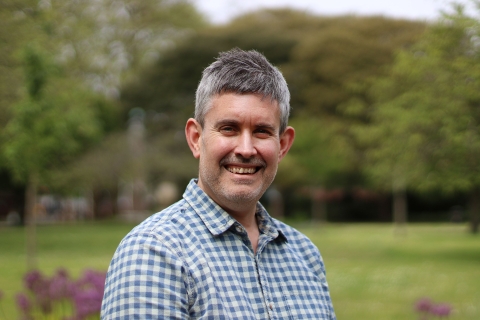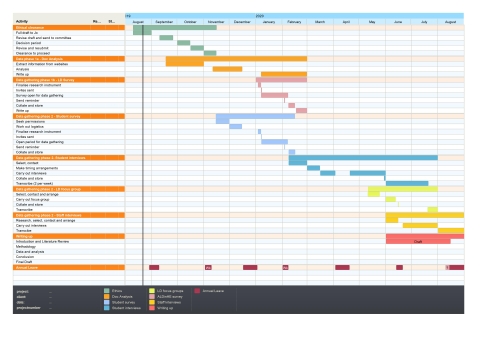

Each month, the Graduate School is sharing a Student Spotlight with our postgraduate research community, highlighting the amazing research being undertaken by our postgraduate researchers.
5 minutes
Our Student Spotlight for February is Ian Johnson, who has recently completed a Professional Doctorate in Education (EdD). Ian has kindly taken the time share his experiences of studying for a Professional Doctorate and his top tips to other Professional Doctorate students.
I was part of the first cohort that started the Professional Doctorate in Education (EdD) what feels like a lifetime ago in 2017. Before that, I had held my role – Learning Development Tutor – at University of Portsmouth for two years, and have continued in it ever since.
My work involves supporting students to navigate the sometimes-alien world of academia, build their abilities and to enjoy greater success in their assignments and ultimately their degrees. Whilst this was a job I always enjoyed doing, I was aware of how the work can often instead be reductively viewed as “study skills” and that the way Learning Developers go about their work was under-theorised. Furthermore, across the UK and even within different departments of this university, we are known by different names, occupy different spaces within institutional architecture, and see huge variation in our duties and the way our work is sold to students and staff. These facts have knock-on implications professionally for our reputation, identity and job security. It’s a minefield!
It was considerations like these that piqued my curiosity and motivated me to take the leap into the unknown to becoming a full-time worker and part-time doctoral student simultaneously. My thesis was entitled “The framing and value of Learning Development work in British Higher Education: An illuminative evaluation into professional practice”. What I found is for another day (though if you’re interested, do please have a look). In this blog, I am going to explore what the experience was like, and what others might learn from it. There was a method to my madness and a madness to my method, as I will now set out!
Ian's Top Tips!
Combining work and study was never easy, with the pandemic, lockdowns and working from home arriving just before my data collection and only adding to the fun. I feel that studying full time and working part time together means I faced a different set of problems to the typical PhD student (if such a thing exists). Not for me the threat of isolation and long days sat at home staring at an empty screen. Rather – how on earth to make time and create the right headspace(s) for work, study, and my friends and family? Having been through and survived the experience, though, I now hope I can offer some wisdom to the collective who might be trying to navigate the same path.
Be realistic and honest with yourself and others about the time it will take you
Point of honesty number 1 – you are signing away a lot of your evenings and weekends for a while, if you want to get through this promptly. Be honest with those around you about the time you’ll need, and negotiate it with them – it is their lives your doctorate is affecting too. I really can’t overstate the importance of this one.
Point 2 – if you are undertaking a professional doctorate, plan for it to take six years and see anything quicker as a bonus: this is better than planning for four years and then being disappointed. Of my cohort of 20 plus PGRs, only two finished before the six-year mark.
Set yourself small deadlines so you feel like you’re achieving something
The two-year initial taught phase was structured with regular deadlines for formative and summative assessments, much as a Master’s course would be. Then it is pretty much “BAM” – you are on your own with your supervisory team. The loss of that structure affected many of us greatly. At this point, you need to start setting yourself small goals so you can see the project building brick by brick. Use a GANTT chart or similar to plan your activities, and revisit it – every week when planning that week – to see how you’re progressing. The ethics form is the first big hurdle – accept it will take time, but that time will pay you back in spades later because everything is then nicely set up and ready to use.

Example GANTT chart relating to Ian's thesis - set up on Tom's Planner.
Taking breaks matters
When faced with too much to do at once, it can be tempting never to take a break, but you should. If you’re blanking for hours one day, give up and go and do something you like instead, and try again tomorrow. Run a bath, have a walk, do whatever it is that will get your mind into a better place. It is also important to take longer breaks – remember those lovely things called holidays? Listen to what your friends and family say about this too. Oftentimes, I found mine knew me better than I knew myself. If they are all telling you at the same time that you need a break, key in to whatever it is they’re seeing and take one. I foolishly ignored such advice early in my final year, hit the rockiest period of the whole process, and was only then able to get back on track after taking three weeks off from work and study. It will affect your mental health if you don’t take breaks – prioritise yourself.
Get to know when your ‘potentially productive weeks’ are, and plan in advance for them
If you’re working full time, then being realistic, you will know that there will be weeks when you get the sum total of nothing done on your doctorate. Be OK with this – plan for it if need be – but don’t let those weeks become months or start letting valid reasons turn into crafty excuses. And to go with this, work out when the weeks are that you can get more done to compensate. The summer is an obvious time for many, but to keep the momentum, you need to try and find weeks across the year. When are the weeks when work is a bit less hectic? For me it would often be those either side of Christmas or Easter, when term was either winding down or not quite yet winding up.
Keep your friends and colleagues close …
Face the fact that nobody in your life is going to understand what it feels like doing a doctorate, apart from other people who have lived or are living that experience. With friends outside of academia, you may come to dread the question “How’s the study going?”, followed about 30 seconds later with “When does it finish again?” (Remember – be kind, they don’t mean to be annoying but they just don’t ‘get it’). I either curtailed these conversations after 30 seconds, or spent about an hour on them – depending on whether the person actually wanted to listen!
Finding your people around the university and broader academia is thus an important step. Use opportunities that your Faculty or the Graduate School offer to build your networks. These people can become an ear, a critical friend, a distraction … getting them into your life is important. Most Professional Doctorates give you a head start with this, as you will be in a taught cohort for the first year or two.
Maybe you have other professional and research networks – find your people there too. There will always be others out there living a similar experience. I set up a Community of Practice for research-active learning developers within our professional association. Three of those people have become friends and regular co-authors. This is really what is meant by “academic citizenship” – becoming part of that bigger community. It also enabled me to get published at intervals throughout the process of writing my thesis. When I came out the other side, I did not have the painful next step to take of becoming an ‘academic with the right to publish’ - I already was one! Professional doctorates give us something of a unique opportunity in this respect, to become published authors while still being students. Getting to know the people who might help you with that is crucial.
… and your supervisors closer!
Keeping open relationships with your supervisors is vital. If you can, tell them how you want to work with them. How much do you need them to set you deadlines? How much do you want to speak to them about progress? What feedback do you want, when and in what form? What support do you need? Want them to be brutally honest with you? Tell them. Want them to forget about it this week and take you for a coffee? Tell them. Got something going on in life that is slowing things down? Tell them. Remember, though they are not there to be your best friend, it is in their interests to get you through too!
This too will end!
The most important thing is to feel like you are getting somewhere at all times, not drifting along aimlessly. You can’t get too far ahead of yourself, as each stage depends on the previous. However, there is always something you can be doing, even if your brain is not in its most productive mode (referencing is usually a good one for the worst days!). As you start to see the finish line in sight – and with the very important caveat that your supervisors must also see that line – you might find that impetus starts to build, a bit like running the last mile of a race. Knowing the right moment to finally hit the send button and release it into the wild is a bit scary (I had to get my partner to do that bit for me). But remember, in all likelihood you will get at least minor corrections from your viva – a pass without any corrections is a bit like a blue moon. So ‘submit’ is not the scary final end point that it might feel like.
I hope I’ve succeeded in communicating that while a Professional Doctorate was certainly not an easy lifestyle choice, that with enough determination, planning and support, getting out the other side is possible and rewarding. Good luck with your journeys!
If you would like to feature in our student spotlight section please email graduate.school@port.ac.uk to discuss this further.
